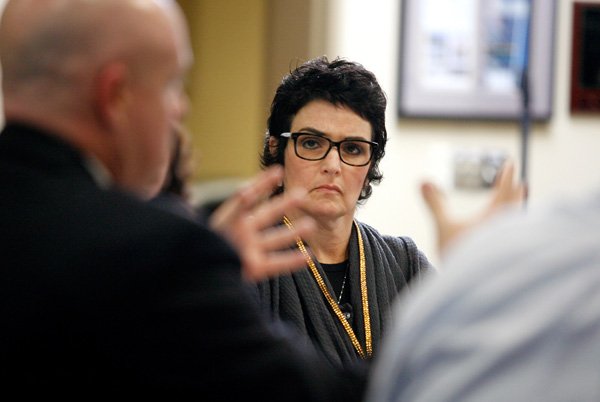BENTONVILLE — The Bentonville School Board voted to put a second high school millage increase proposal before voters during its special meeting on Monday.
The board voted 6-1 in favor of the action. Willie Cowgur, board member, voted against the option.
Cowgur said he is unable to vote for a second high school without further reviewing other alternatives.
“Maybe the second high school is the way to go,” Cowgur said before the vote. “But I can’t support it unless we at least look at other options.”
Cowgur pointed out that a millage increase that would have produced money to build a second high school failed in June.
At A Glance
School Survey
A survey sent out by the Bentonville School District earlier this year asked voters why they did or didn’t support a millage increase in June for a second high school. Resolving overcrowding was chosen by 505 of respondents as the top reason they voted for the increase. The cost of the plan was chosen by 474 respondents as the top reason they voted against the increase. More than 1,700 postcards were returned.
Source: Staff Report
The 6.7 millage increase would have constructed a 2,000-student-high school in Centerton. If the millage increase had passed, the district would have received $128 million to build the high school and upgrade districtwide technology and heating and cooling systems.
Grant Lightle, board member, said voters turned down an increase because it cost too much, not because it was a second high school.
“I wouldn’t have voted for that if I didn’t have skin in the game,” Lightle said. “This is not rocket science.”
Travis Riggs, board president, said he was not opposed to alternatives but past surveys have showed the public does not support them.
Results of a postcard survey released last week show a majority of respondents support a second high school, but with a reasonable price tag.
Out of 3,936 surveys returned to the district, 59 percent (2,334) support a second high school at a lower cost than what was proposed last summer when a millage increase fell flat before voters.
The postcard survey went out last month to the 9,630 voters who participated in the June 26, 2012, failed millage increase election. That 6.7-mill increase soundly voted down by voters would have paid for a second high school. That millage package was for $128 million.
Twenty-four percent (923 surveys) said they would not support any solution that would raise taxes. Another 17 percent (682 surveys) said they would not support a second high school, but another option such as a ninth-grade center.
The Bentonville School District sent out 9,630 post-cards to voters who participated in the June election.
The vote to move forward with the second high school came after more than an hour discussion on how or if the board would continue to engage the public in the decision making process. Board members unofficially decided to hold public forums after receiving more information on the capacity issue along with a demographics study. The study will show student enrollment projections.
The forums could be held as soon as March or as late as May depending on when the information is available, Riggs said.
Kevin Lyles, a community member, attended the meeting. He did not like the fact that the board chose not to engage the public further before deciding on a second high school.
“There will be a fight going forward,” Lyles said. “The board is saying it will not listen because 41 percent responded to a survey. To me that is 59 percent of the community telling the board they don’t trust them.”
Adriana Barajas, another community member, was excited by the decision.
“I am very pleased that the board is listening to the community,” Barajas said. “It is the time to move forward with a second high school.”

